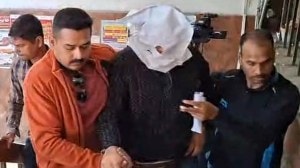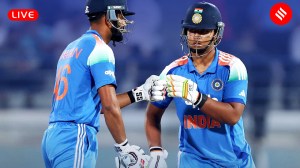In Assam’s Barak Valley, Bengali Hindus find CAA is not all they hoped it would be
Many believed the CAA would bring relief to those excluded from the NRC and facing cases in Foreigners Tribunals. Instead, it seems like the beginning of another bureaucratic ordeal
 Desperate to clear my name, says Ajit Das, who runs a shop in Amraghat Bazaar,
30 km from Silchar. Express
Desperate to clear my name, says Ajit Das, who runs a shop in Amraghat Bazaar,
30 km from Silchar. ExpressAjit Das’s ordeal began in 2014 when he first received a notice that his citizenship was under investigation. Over the last 10 years, his struggle to prove his Indian citizenship has included three months of detention, and culminated in an order by the Foreigners Tribunal in 2021 declaring him a foreigner.
Das says his father and grandfather fled from East Pakistan in 1956 and spent a few months in a refugee camp in Monacherra in Assam’s Hailakandi district. Here, he was given a refugee certificate, the only document of his father’s that Das possesses. This crucial document failed to convince the Foreigners Tribunal No. 6 in Silchar, which stated that there was no corresponding record available with the government.
Das has heard that the process of registering for the Citizenship Amendment Act has begun, and is supposed to benefit families such as his. But the ever-smiling man, whose appeal against the Foreigners Tribunal is now in the Gauhati High Court, is tired. “I have two sons and I am desperate to clear my name, because if I don’t, this burden will pass on to them,” he said.
After years of trying to prove that he is an Indian, trying to avail of the CAA would mean a new burden of proof on him – one that turns his previous effort on its head.
It was on March 11 that the Centre notified rules for the CAA, paving the way for the implementation of the law more than four years after it was passed by Parliament in December 2019. It will benefit thousands of Hindu, Sikh, Buddhist, Jain, Parsi, or Christian migrants from Pakistan, Bangladesh, and Afghanistan who entered India before December 31, 2014, and seek citizenship of India. This group of people has been living in India illegally or on long-term visas.
The applicant requires at least one document under Schedule 1A of the CAA rules to prove a person is a national of Bangladesh, Afghanistan or Pakistan. In Das’s case, these include a passport, birth certificate, education certificate, identity document, land or tenancy records, or any other document from the government of Bangladesh to prove he is from the country. Alternatively, he can produce a document showing that either of his parents, grandparents or great-grandparents are or have been a citizen of Bangladesh.
But he is hard-pressed to find such a piece of paper: “I am not a foreigner. I was born here, have gone to school here, and I am confident of all my documents for Indian citizenship. Yes, my father did come from Bangladesh but I am not sure of what the process was. The only document I have of his is the refugee certificates and that has already been rejected by the Foreigner’s Tribunal. Will it help me now?”
Das runs a small novelty shop in Amraghat Bazaar, around 30 km from Silchar in the heart of Assam’s Barak Valley, which has a largely Bengali population. While the passage of the CAA witnessed intense protests across Assam in December 2019, especially in the primarily Assamese speaking Brahmaputra valley, the reception was very different in Bengali-dominated districts of Cachar, Karimganj and Hailakandi in Barak Valley.
This region, which shares more than a 125-km international border with Bangladesh, saw a large Bengali Hindu population migrate to it after Partition to escape persecution in what was then East Pakistan. Many sections there believed that the CAA will bring relief to Bengali Hindus who were excluded from the NRC and are facing cases in Foreigners Tribunals.
But now that the CAA process has become clearer, even its biggest votaries find that it is not all that they had hoped for. “We did andolans, signature campaigns in support of the Act,” said Basudeb Sharma, president of the All Assam Bengali Hindu Association, which had celebrated its passage and waited for the rules with deep anticipation.
He spoke to The Indian Express shortly before his and other like-minded organisations convened a meeting last week to weigh how much the final rules actually help their cause.
“Once we analysed the rules, one thing that became clear is that applicants will need a document from East Pakistan or Bangladesh and should be able to specify their date of entry. These are people who fled without any preparation and somehow reached India. We have sent a memorandum to the Prime Minister that the rules should be amended and that a self-declaration from people without documents should suffice. Another thing is that while they apply, they have to say they are foreigners. It should be ensured that there should be protection to people who make such a declaration,” said Sharma.
Kamal Chakraborty, an activist working on citizenship issues in the Barak Valley, is more direct in his criticism: “Two things that I had been advocating for were unconditional citizenship to Partition victims and citizenship by birth. Here, neither of these things are being granted. There are so many different citizenship exercises going on in Assam – 19 lakh people have been excluded from the NRC, which is yet to be notified; there are people marked as ‘Doubtful Voters’; there are people whose cases are pending in Foreigners Tribunals. What does the CAA mean for all these people who have been trying so far to prove that they are Indian? Will they now declare themselves foreigners?”
A recent statement by Chief Minister Himanta Biswa Sarma – that the CAA would only benefit those non-Muslims who had applied for the NRC and had been left out – only created more questions than answers in the area. The final NRC list was released in August 2019 and had excluded 19 lakh people, and at that time, Sarma had told The Indian Express that about 5-6 lakh of those excluded were people “who have migrated from Bangladesh due to religious persecution before 1971”. For its part, the BJP had been advocating for the CAA as a solution to the woes of Bengali Hindus – an important voter base for the party in the state – excluded from the NRC.
Sishir Dey, an advocate based in Karimganj, said nobody stands to benefit from the CAA rules as they stand. “There are people waiting for the NRC to be finally notified. Many of them have been excluded simply because of errors. Once the NRC is notified, they can enter the appeal process and successfully get their names added to the NRC. On the other hand, those who have genuinely come from Bangladesh and people who will not be able to clear the process do not have the required documents (for CAA). If there was an affidavit or self-declaration system, it may have been helpful to them,” he said.
Many Bengali Hindus stuck in the NRC limbo would rather take the process to its logical conclusion than opt for the CAA. For instance, Pinaki Das, who runs a printing press in Silchar city, suspects that his wife Momita was excluded because her PAN card carries her maiden surname while her name in the voter list carries his surname.
“There’s no question of us ever thinking of the CAA. My family has land documents from as far back as 1913 in Cachar, her grandfather was part of the Assam Police. We will wait for the government to inform us of the reason so we can address the issue with our documents,” he said.
In the meantime, Das said he will choose to “wait and watch”. “I am not very clear on what the next step should be. The good thing is that I am not alone in this, there are lakhs of people on the same boat. I will wait for some people to apply under the CAA and see what their experience is. I have very little trust left in this process.”







